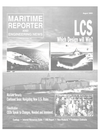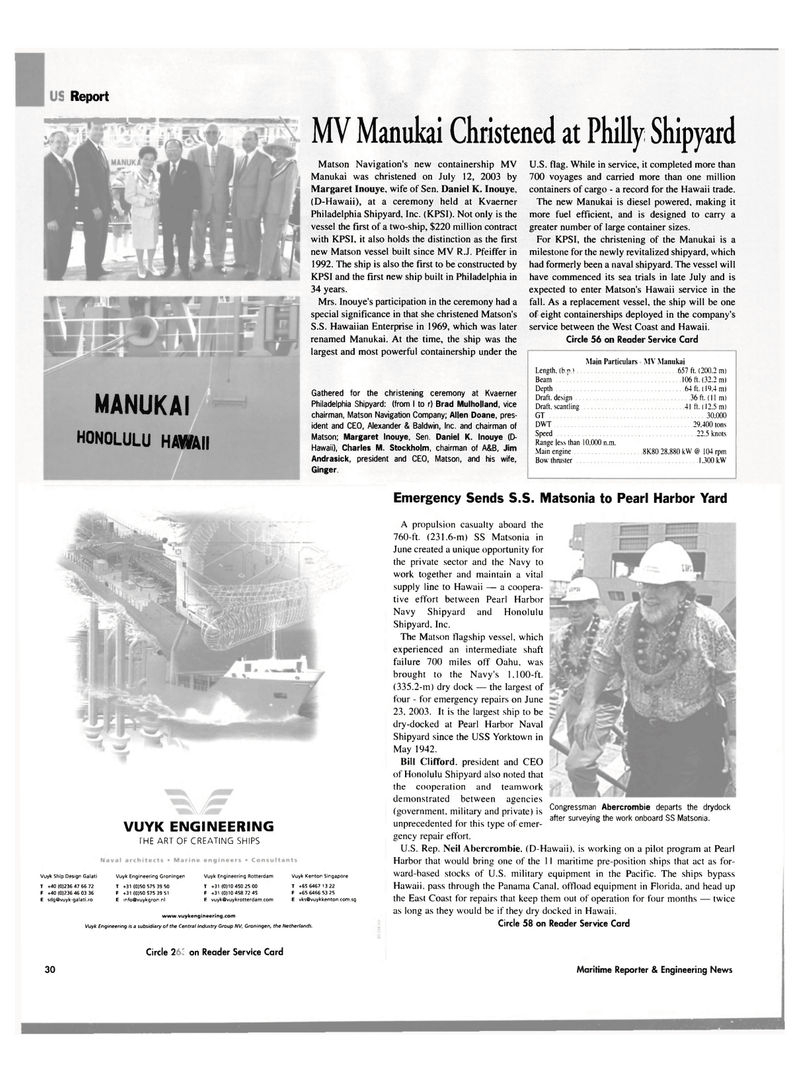
Page 30: of Maritime Reporter Magazine (August 2003)
Read this page in Pdf, Flash or Html5 edition of August 2003 Maritime Reporter Magazine
RIB Report
MV Manukai Christened at Philly Shipyard
Matson Navigation's new containership MV
Manukai was christened on July 12, 2003 by
Margaret Inouye, wife of Sen. Daniel K. Inouye, (D-Hawaii), at a ceremony held at Kvaerner
Philadelphia Shipyard, Inc. (KPSI). Not only is the vessel the first of a two-ship, $220 million contract with KPSI, it also holds the distinction as the first new Matson vessel built since MV R.J. Pfeiffer in 1992. The ship is also the first to be constructed by
KPSI and the first new ship built in Philadelphia in 34 years.
Mrs. Inouye's participation in the ceremony had a special significance in that she christened Matson's
S.S. Hawaiian Enterprise in 1969, which was later renamed Manukai. At the time, the ship was the largest and most powerful containership under the
Gathered for the christening ceremony at Kvaerner
Philadelphia Shipyard: (from I to r) Brad Mulholland, vice chairman, Matson Navigation Company; Allen Doane, pres- ident and CEO, Alexander & Baldwin, Inc. and chairman of
Matson; Margaret Inouye, Sen. Daniel K. Inouye (0-
Hawaii), Charles M. Stockholm, chairman of A&B, Jim
Andrasick, president and CEO, Matson, and his wife,
Ginger.
U.S. flag. While in service, it completed more than 700 voyages and carried more than one million containers of cargo - a record for the Hawaii trade.
The new Manukai is diesel powered, making it more fuel efficient, and is designed to carry a greater number of large container sizes.
For KPSI, the christening of the Manukai is a milestone for the newly revitalized shipyard, which had formerly been a naval shipyard. The vessel will have commenced its sea trials in late July and is expected to enter Matson's Hawaii service in the fall. As a replacement vessel, the ship will be one of eight containerships deployed in the company's service between the West Coast and Hawaii.
Circle 56 on Reader Service Card
Main Particulars MV Manukai
Length, (b.p.) 657 ft. (200.2 m)
Beam 106 ft. (32.2 m)
Depth 64 ft. (14.4 m)
Draft, design 36 ft. (11 m)
Draft, scantling 41 ft. (12.? m)
GT 30.000
DWT 29.400 tons
Speed 22.5 knots
Range less than 10.000 n.m.
Main engine .8K80 28,880 kW @ 104 rpm
Bow thruster 1.300 kW
Emergency Sends S.S. Matsonia to Pearl Harbor Yard
Vuyk Ship Design Galati
T +40(0)236 47 66 72
F +40(0)236 46 03 36
Vuyk Engineering Groningen
T +31 (0)50 575 39 50
F +31 (0)50 575 39 51
Vuyk Engineering Rotterdam
T +31 (0)10 450 25 00
F +31 (0)10 458 72 45
Vuyk Kenton Singapore
T +65 6467 13 22
F +65 6466 53 25
E [email protected] www.vuykengineering.com
Vuyk Engineering is a subsidiary of the Central Industry Group NV, Groningen, the Netherlands.
Circle 218 on Reader Service Card
VUYK ENGINEERING
THE ART OF CREATING SHIPS
MANUKAI
HONOLULU HAWAII
A propulsion casualty aboard the 760-ft. (231.6-m) SS Matsonia in
June created a unique opportunity for the private sector and the Navy to work together and maintain a vital supply line to Hawaii — a coopera- tive effort between Pearl Harbor
Navy Shipyard and Honolulu
Shipyard, Inc.
The Matson flagship vessel, which experienced an intermediate shaft failure 700 miles off Oahu, was brought to the Navy's 1,100-ft. (335.2-m) dry dock — the largest of four - for emergency repairs on June 23, 2003. It is the largest ship to be dry-docked at Pearl Harbor Naval
Shipyard since the USS Yorktown in
May 1942.
Bill Clifford, president and CEO of Honolulu Shipyard also noted that the cooperation and teamwork demonstrated between agencies (government, military and private) is Congressman Abercrombie departs the drydock , , r after surveying the work onboard SS Matsonia. unprecedented tor this type of emer- gency repair effort.
U.S. Rep. Neil Abercrombie. (D-Hawaii). is working on a pilot program at Pearl
Harbor that would bring one of the 11 maritime pre-position ships that act as for- ward-based stocks of U.S. military equipment in the Pacific. The ships bypass
Hawaii, pass through the Panama Canal, offload equipment in Florida, and head up the East Coast for repairs that keep them out of operation for four months — twice as long as they would be if they dry docked in Hawaii.
Circle 58 on Reader Service Card 30 Maritime Reporter & Engineering News

 29
29

 31
31
